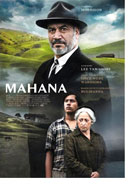

Opening 1 Sep 2016
Directed by:
Lee Tamahori
Writing credits:
John Collee, Witi Ihimaera
Principal actors:
Temuera Morrison, Akuhata Keefe, Nancy Brunning, Jim Moriarty, Regan Taylor
Tradition, family, respect for elders, and the awe-inspiring land – time-honored intrinsic values of the Māori. Tamihana’s (Morrison), the Mahana whānau’s obstinate patriarch, autocratic decisions concerning the family enterprises is respectfully accepted. Contrarily, Ramona’s (Brunning) kindnesses blunt her husband’s character. Their children and families share work, confidences, and gossip, bound by customs, survival, and love. The 1960s usher worldwide transformations that bright, curious teenagers embrace, questioning long-held convictions. At fourteen, Simeon’s (Keefe) parents (Taylor, Maria Walker) abide his self-assurance, much to his grandfather’s chagrin. Stymieing Simeon is Tamihana’s feud with Rupeni Poata (Moriarty) and Poata clan; palpable is a classmate’s (Yvonne Porter) effect. In this east coast New Zealand community, sheep are indispensable and Gisborne’s sheep-shearing contest competitive spirit intoxicating. This year, strange rivalries beget surprises and a profound yet cleansing outcome.
Based on Witi Ihimaera’s 1994 novel, Bulibasha: King Of The Gypsies, John Collee’s screenplay under Lee Tamahori’s direction transfers beautifully to film. Auckland is the unspoken cast member whose humbling, palpable presence the cast matches, and Ginny Loane’s camera emotively embraces. Sweeping through Mahana’s dramatic highs and lows is Mahuia Bridgman-Cooper and Tama Waipara’s musical eclecticism: contemporary1960s, Western, and traditional Māori. For authenticity, production values—design, art direction, set decoration, costume design—overcame challenges. Sam and Emily Welch, from North Waikato, shouldered the responsibility of replicating a 1960s shearing competition, including finding sheering shoes (40 pairs) worn then. Although a “coastie”—someone raised between Gisborne and East Cape—learning to milk cows and sheer sheep was hard work for Keefe. Just as, albeit forbidden to use another family’s (sacred) tā moko (tattoo), makeup designer Susan Glass received Māori permission for Ramona’s moko kauae (chin tattoo).
This family drama’s spectrum of poignantly fluctuating, often-controversial generational choices, expectations, secrets, and regrets is enhanced by indigenous Māori ethnic distinctions. Although lineages endlessly replicate, every era’s influences produce repercussions. Some more than others, frequently entertaining, always enlightening. This heartwarming gem is worth seeing. (Marinell Haegelin)
This Maori Saga begins with the grandfather (Morrison) ruling the family with an iron fist, and everyone in the family obeys without question. They all know that they would not have the financial status that they have if it weren’t for this man. They all know that grandfather Tamihana knows best. He is religious, responsible, diligent and disciplined, and he expects his family to fit perfectly into his mold. He particularly takes interest in his youngest grandson Simeon Mahana (Keefe), who shows promise but acts like a wild stallion. It doesn’t take long before they butt heads since Simeon not only questions his grandfather’s decision making but dives into the forbidden past of his grandparents, leaving no stone unturned.
The film has a grandiose style with wonderful costumes and stylish cars, but when I compare it to some of the other successful sagas like Gone with the Wind or Roots, the emotional conflict and inner turmoil are there but don’t run deep enough to convince me that these characters are really struggling with their situation. It could be due to the fact that I saw this film in German, and the dubbing didn’t do justice to the film. But if you are at all interested in sheep and the rural life in New Zealand, this film does an excellent job of showing it, and it includes a sheep shearing contest that makes you sweat. (Shelly Schoeneshoefer)